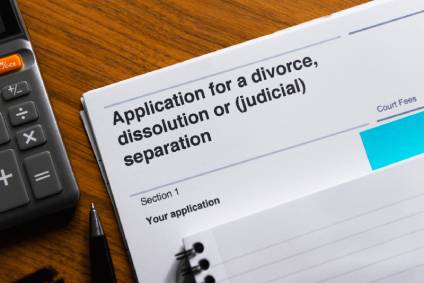Nobody plans to get divorced when they first marry each other. But over time, things happen to cause huge rifts in the marriage. Many couples find themselves blindsided when divorce becomes a serious concern. No matter why divorce happens, it can be complicated, emotional, and even traumatic for all concerned.
We want to help make your divorce process as simple and peaceful as possible. That’s why we’ve gathered the answers to some common questions you may have as you face this daunting journey.
How to file for divorce in your state
In the U.S., states vary in the divorce laws and required forms that you must fill out. You can go to your local courthouse to get the forms you need or find them online on your state court website.
You’ll need to start by filing for divorce and serving your spouse with an official complaint or petition. Use this document to be clear with your reasons for requesting a divorce and what you want out of the deal: child custody and support, property distribution, etc.
It’s legal—and fair—to give your spouse the chance to respond to your divorce filing. Some states may require you and your spouse to attend mediation in an effort to fix the marriage. If you can’t reconcile your differences, the court will schedule a trial for a judge to determine your outcome after hearing from you and your spouse.
How to start the divorce process
Regardless of which state you are in, you will generally need to file three different forms when you are trying to start your divorce:
- Summons: You will file your summons with the local court to serve it to your spouse as a notification of your divorce request.
- Complaint: As previously mentioned, this is the official paperwork detailing why you want a divorce and what you want out of it. The judge will read this over to understand your position.
- Family Court cover sheet: As the plaintiff or petitioner, you will file this form, which contains details about you, your spouse, and any children you may have. The other spouse will be the defendant or respondent in the court case.
File these forms with your local court clerk to make them official.
 What is a divorce decree?
What is a divorce decree?
After a few days, weeks, or even months (depending on the complexity of your case) the judge will make a final decision about your divorce. The judge will put this decision in writing and sign the divorce decree.
What are the divorce requirements?
Grounds for divorce
You must have legal reasons for why you want a divorce. You will choose between fault and no-fault. No-fault is generally easier to handle, since you don’t need testimony or hard evidence. Fault divorce would be a situation wherein one spouse wants a divorce because the other has committed adultery, is addicted to substances, or is guilty of abandonment or neglect.
Residency requirements
Your state has certain requirements concerning your residency that you must meet before the court will consider your divorce case. You need to be able to prove that you’ve lived in that state and county for the correct amount of time needed before you can file for divorce.
Waiting periods
As annoying as it may sound, most states will make you wait for a while before your divorce can be finalized. The court may require this, so you and your spouse have time to work out details like child custody and support and property distribution. They also may want to give you and your spouse a chance to patch things up. If you do reconcile, you are legally allowed to withdraw your divorce petition.
What are contested vs. uncontested divorce filings?
A contested divorce is the more complicated and sometimes more traumatic divorce option. It’s also probably the kind of divorce you hear more about in the news or everyday life. If the spouses are unable to settle their differences, the judge will end up making decisions for the separating couple. Of course, this means that one or both spouses will not receive exactly what they wanted out of the deal. As a result, it is helpful if the couple can at least speak cordially with one another to work out the details.
What is an uncontested divorce?
 Uncontested divorce is where the couple is able to agree equally on the divorce arrangements. These agreements will not be appealable, meaning that they will essentially be set in stone once the divorce is final. However, some arrangements can be modifiable; if an ex-spouse’s situation changes drastically, the exes may be able to modify the original terms of their divorce. Uncontested divorces are usually a faster process than contested.
Uncontested divorce is where the couple is able to agree equally on the divorce arrangements. These agreements will not be appealable, meaning that they will essentially be set in stone once the divorce is final. However, some arrangements can be modifiable; if an ex-spouse’s situation changes drastically, the exes may be able to modify the original terms of their divorce. Uncontested divorces are usually a faster process than contested.
How much does a divorce cost?
According to Forbes, a divorce in the U.S. can cost anywhere from $15,000 to $20,000. Of course, this cost can change quickly based on how long and complicated your divorce proceedings become.
How long does a divorce take?
It’s hard to put an exact amount of time on the divorce process. This is because it is affected by many different factors:
- The laws and requirements in your area
- The dates when your court and judges will be available to hear your case
- What kind of divorce you file for (no-fault or fault)
- Contested vs. uncontested divorce
- The kind of possessions and assets you and your spouse are dividing
- Disagreements on child custody and support
What should you do immediately after a divorce?
Take a moment to breathe and remind yourself that the worst is over. Now it’s time to start rebuilding your life in the next chapter. Start by making sure all your legal responsibilities are taken care of. It would be unpleasant for you to begin moving on, only to find that you still have requirements to fulfill.
 Make sure your Will, insurance policies, medical directives, and other essential legal documents all reflect your current marital status, dependents, and beneficiaries. If you are changing your name, thoroughly collect all the appropriate documents to begin this process.
Make sure your Will, insurance policies, medical directives, and other essential legal documents all reflect your current marital status, dependents, and beneficiaries. If you are changing your name, thoroughly collect all the appropriate documents to begin this process.
Do I need a divorce lawyer?
The divorce process is not something that anyone wants to go through, but should you find it necessary to end your marriage, you will want to have a divorce lawyer or a family lawyer to call upon for help. You’ll have divorce forms and papers to sign, in addition to dividing your property and considering custody of any children. Make sure you’re protected.
LegalShield Members allow you to work with a LegalShield provider lawyer to sort through the complicated questions and legal documents that come with divorces. Your law firm will help you do what’s best for your family, while making sure your own interests are safe as well.
LegalShield’s divorce services help in many different areas of divorce:
- Consultation on your home, accounts, and other assets and how they may be divided
- Obligations to your common debt
- Custody arrangements for your children
- Review of any prenuptial agreements or any divorce documents to you need to submit
You can’t avoid the filing fees that come with a divorce, but you can avoid spending a fortune on the necessary legal services. Find out more about how LegalShield can help today.
See also: Here are 7 extra tips you might need when going through divorce
Pre-Paid Legal Services, Inc. (“PPLSI”) provides access to legal services offered by a network of provider law firms to PPLSI members through membership-based participation. Neither PPLSI nor its officers, employees or sales associates directly or indirectly provide legal services, representation, or advice. The information available in this blog is meant to provide general information and is not intended to provide legal advice, render an opinion, or provide any specific recommendations. The blog post is not a substitute for competent legal counsel from a licensed professional lawyer in the state or province where your legal issues exist, and the reader is strongly encouraged to seek legal counsel for your specific legal matter. Information contained in the blog may be provided by authors who could be a third-party paid contributor. All information by authors is accepted in good faith, however, PPLSI makes no representation or warranty of any kind, express or implied, regarding the accuracy, adequacy, validity, reliability, availability, or completeness of such information.





